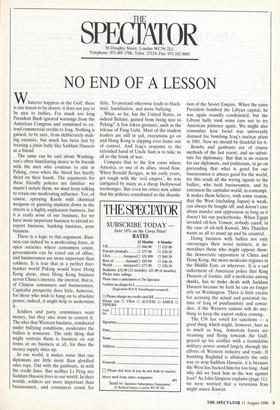NO END OF A LESSON
Whatever happens in the Gulf, there is one lesson to be drawn: it does not pay to be nice to bullies. For much too long President Bush ignored warnings from the American Congress and continued to ex- tend commercial credits to Iraq. Nothing is gained, to be sure, from deliberately mak- ing enemies, but much has been lost by treating a plain bully like Saddam Hussein as a friend.
The same can be said about Washing- ton's often humiliating desire to be friends with the men who continue to rule in Peking, even when the blood has hardly dried on their hands. The arguments for these friendly policies are familiar: we mustn't isolate them, we must keep talking to retain our moderating influence. Yes, of course, spraying Kurds with chemical weapons or gunning students down in the streets is a highly unpleasant business, but it is really none of our business, for we have more important business to attend to: export business, banking business, arms business.
There is a logic to this argument. Busi- ness can indeed he a moderating force, in open societies where consumers count, governments can be voted out of office, and businessmen are more important than soldiers. It is true that in a perfect free- market world Peking would leave Hong Kong alone, since Hong Kong business serves China's interest, the interest, that is, of Chinese consumers and businessmen. Capitalist prosperity does little, however, for those who wish to hang on to absolute power; indeed, it might help to undermine it.
Soldiers and party commissars want money, but they also want to control it.
The idea that Western business, conducted under bullying conditions, moderates the bullies is nonsense. The only thing that might restrain them is business on our terms or no business at all, for then the money supply dries up.
In our world, it makes sense that our diplomats are little more than glorified sales reps. Out with the gunboats, in with the credit lines. But neither Li Peng nor Saddam Hussein lives in our world. In their worlds, soldiers are more important than businessmen, and consumers count for little. To pretend otherwise leads to black- mail, humiliation, and more bullying.
What, so far, has the United States, or indeed Britain, gained from being nice to Peking? A few token gestures, such as the release of Fang Lizhi. Most of the student leaders are still in jail, executions go on and Hong Kong is slipping ever faster out of control. And Iraq's response to the extended hand of Uncle Sam is to take us all to the brink of war.
Compare that to the few cases where America, or one of its allies, stood firm. When Ronald Reagan, in his early years, got tough with the 'evil empire', he was castigated by many as a cheap Hollywood warmonger. But even his critics now admit that his policies contributed to the dissolu- tion of the Soviet Empire. When the same President bombed the Libyan capital, he was again roundly condemned, but the Libyan bully took some care not to try American patience again. We might also remember how Israel was universally damned for bombing Iraq's nuclear plant in 1981. Now we should be thankful for it. Bombs and gunboats are of course methods of the last resort, and no substi- tute for diplomacy. But that is no reason for our diplomats, and politicians, to go on pretending that what is good for our businessmen is always good for the world, for this sends all the wrong signals to the 'bullies, who hold businessmen, and by extension the capitalist world, in contempt.
It makes them believe, with some reason, that the West (including Japan) is weak, can always be bought off, and doesn't care about murder and oppression as long as it doesn't hit our pocketbooks. When Egypt invaded oil-less Yemen, nobody cared; in the case of oil-rich Kuwait, Mrs Thatcher wants us all to stand up and be counted.
Doing business with bullies not only encourages their worst instincts, it de- moralises those who might oppose them: the democratic opposition in China and Hong Kong, the more moderate regimes in the Middle East, or wherever. It is a sad indictment of American policy that King Hussein of Jordan, still a moderate among sharks, has to make deals with Saddam Hussein because he feels he can no longer rely on Washington. There is little excuse for accusing the actual and potential vic- tims of Iraq of pusillanimity and cowar- dice, if the Western nations will do any- thing to keep the export orders coming.
The UN has voted for sanctions — a good thing which might, however, hurt us as much as Iraq. American forces are steaming and flying towards the Gulf, geared up for conflict with a formidable military power armed largely through the efforts of Western industry and trade. If bombing Baghdad is ultimately the only way to stop Saddam Hussein, it is because the West has backed him for too long. And why did we back him in the war against Iran? As John Simpson explains (page 11): we were worried that a victorious Iran might annex Kuwait.










































 Previous page
Previous page